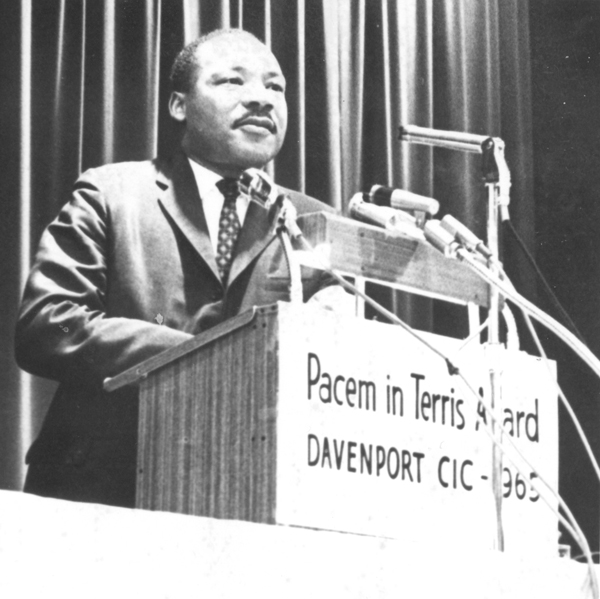
Martin Luther King, Jr., accepts the Pacem in Terris Peace and Freedom Award in Davenport on April 28, 1965.
By Timothy Walch
For The Catholic Messenger
“The arc of the moral universe is long,” the Reverend Martin Luther King, Jr. often said, “but it bends toward justice.” The quote was not original to King, but the sentiment was central to the civil rights movement in Davenport. The archives of The Catholic Messenger tell the story.
Racial justice evolved in the Diocese of Davenport throughout the 1960s, with the campaign centered in the Catholic Interracial Council (CIC). Led by Charles Toney of the NAACP and Father Marvin Mottet from St. Ambrose College in Davenport, the CIC shared its mission in the Messenger. In January 1962, for example, Father Mottet called on Catholics to speak up against racism. “Their silence must be broken,” he said, “and their weight thrown behind justice.”
In 1963, the CIC worked to pass national civil rights legislation and participate in a national march on Washington on Aug. 28. A local rally for civil rights also took place in Davenport. “They marched into the rally area 400 strong carrying signs and singing songs,” noted the Messenger on Aug. 29.
Charles Toney reiterated the message of the movement in the Messenger on Dec. 29, 1963. “It is the time for all Catholics” he wrote, “to follow the example of Pope John (XXIII) and speak out against racism. Your silence gives consent to the continuation of discrimination.”
In 1964, the CIC established an award to recognize exceptional achievement on behalf of social justice. Named for Pope John XXIII’s encyclical, the first “Pacem in Terris” Awards were presented to President John F. Kennedy (posthumously) and social activist John Howard Griffin.
The award gained prestige in 1965 when Martin Luther King Jr. received it in person. During his acceptance speech in late April, he told an audience of over 800 Iowans that “we must learn to live together as brothers or perish together as fools.” He further dismissed the myth that civil rights legislation was ineffective. “Perhaps laws cannot change your heart,” he said, “but they can control your habits which eventually will affect your attitudes.”
The relationship between racism, poverty and religion was the focus of the third Pacem in Terris award in the summer of 1966. R. Sargent Shriver, director of the Office of Economic Opportunity, singled out religious faith in the fight against the ravages of injustice. “What is important,” he said, “is how we feel inside, what we do in relation to others.”
Also honored was Charles Toney for his long service on behalf of social justice. It may have been a moment of personal satisfaction for Toney, who was a faithful Catholic and ardent representative for local civil rights organizations. In remarks offered later in the summer, Toney stressed the relationship between churches and racial justice.
The Sept. 1 issue of the Messenger brought news of an important change at the CIC. Sister of Humility Germaine Darmody, CHM, had been appointed to serve as the council’s executive assistant. She became the embodiment of the CIC and its mission.
Substantive challenges remained on the horizon. The public attention given to the civil rights movement in the early 1960s devolved into a malaise. The Messenger captured the mood in a story published Jan. 19, 1967: “The Movement Searches for New Direction.” The Messenger noted two big issues before the CIC. Peaceful protest had only mixed results and the growing conflict in Southeast Asia had shifted attention away from social justice efforts at home.
That was the concern of A. Philip Randolph, the dean of the civil rights movement, when he accepted the fourth annual Pacem in Terris award in the spring of 1967. Randolph insisted that the civil rights and social justice movements were not finished. Much had been accomplished, more remained to be done.
One big issue was fair housing. Efforts to get the Davenport City Council to pass a fair housing ordinance met with resistance. “The council and the mayor have made it clear,” complained News Editor Frank Wessling in the Messenger, “that they do not wish to pass a fair housing ordinance.” However, pressure for action came from Bishop Gerald O’Keefe who called on Catholics to take up the cause of fair housing for all.
Pressure on the mayor and City Council pushed them to pass a modified ordinance in 1968. Alas, it required citizens who filed discrimination complaints to post a $500 bond. This was unacceptable to the CIC. The bond was, in Toney’s words, “a price tag on justice.”
In January 1969, the Messenger announced a change in CIC leadership. After more than three decades of work on behalf of racial equity in the diocese, Charles Toney stepped down as CIC president. “We are grateful to Charles Toney,” Father Mottet said to the Messenger, “for his many years of service to the CIC and for more than 25 years of work for civil rights in this community. Few men have worked harder or accomplished more.”
The 1960s had been a decade of both achievement and frustration. The Catholic Interracial Council had sustained a campaign for open housing and fair employment, with mixed results. One legacy of the CIC may be the Pacem in Terris Award. Since the first presentation in 1964, the award has honored an exceptional range of social justice activists including six winners of the Nobel Peace Prize.
Charles Toney, Father Marvin Mottet, Sister Germaine Darmody and a host of other priests, women religious and committed lay people advocated for racial justice and equality. They marched, petitioned, preached and taught that people of color were a vital part of the diocesan community in general and its Catholic parishes in particular. That is the story told in the archives of The Catholic Messenger.
(Timothy Walch is a lay director of St. Thomas More Parish in Coralville and a member of the Board of Directors of The Catholic Messenger.)











